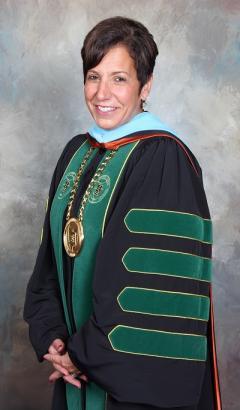A Statement from President Lillian Schumacher

Since accepting the position of President for Tiffin University in 2016, I have been asking myself: Why does our University exist; why do we do what we do? The answer is rather simple; because of our students. We are here to serve our students.
This is an obvious answer and supports our purpose and mission, but it raises other questions: What does “serving our students” mean? Why do students choose TU, and what do we do, exactly, to serve them? The answer is: We are here to ensure that by the time our students graduate from this University, regardless of their major, they are effective contributors to their employers and to their communities.
As a university, we offer a variety of degrees in various disciplines. We teach theory and practice extremely well in hopes that our students learn their profession and develop applicable skills and capabilities to be successful in their field of choice. This is very important, but we can go further. Beyond their discipline-based skills and capabilities, our graduates should also be positive contributors to their employers, communities and society as a whole.

Graduates of Tiffin University, regardless of their area of specialty, are innovative problem solvers who can leverage diversity of any type to work effectively with people who are different from them and produce innovative ideas.
This is why we do what we do every day and is, in essence, what we are about; it is stated as such in our Vision: A premier university for challenging students to enhance their global competencies and 21st century skills for success in a diverse world.
Think about this: On the day of graduation, if someone asks one of our graduating students this question, “What is different about you today compared to the day you started your education at TU,” how would that student respond? How do we want that student to respond? Of course, we want him or her to say, “Today, I have strong skills and capabilities in my field of study.” However, that is a partial answer. We also want our graduates to add, “I am now an innovative problem solver and can better leverage my skills to contribute to my employer, my community and our global society.”
“For any organization to be successful, while a well-thought-out strategic plan is essential, it first needs to fully understand its overall organizational purpose as well as have a full appreciation of the critical role that the organizational culture plays in achieving success. One could easily say that purpose and culture precede strategy. At Tiffin University, President Lillian Schumacher clearly understands that important order. One of her first initiatives upon being named President was to develop the Guiding Principles for the organization. This one-page concise document clearly outlines the purpose of the university, both its mission and vision, as well as establishes a set of values that guide the behavior of every associate. The overall alignment that a document of this nature achieves is essential for success. Now, just developing a document is easy, but making sure that its meaning comes to life every day is what makes it worthwhile. Dr. Schumacher and her team reinforce the essence of this document in every interaction, and it forms the shell around which the strategic plan is built. In multiple other organizations, I have seen this approach work to galvanize the energy of an organization, and I have seen it at Tiffin University as well. Over the long-term when one looks back on the leadership tenure and impact of Dr. Schumacher on Tiffin University, I am convinced that the implementation of the Guiding Principles will be one of the major explanations for her and the organization’s success.”
“Your leadership continues to be an inspiration. Nearly every university in the world says they’re developing global citizens. Tiffin University is actually doing it. Through a comprehensive strategy led from the very top, every student, staff member, and faculty are part of this initiative and we’ll all be better for it. I’ve been watching keenly as Tiffin outpaces other institutions in moving cultural intelligence from a point on a strategic plan to a living reality.”
Celebrating CulTUral Uniqueness (CCU)
